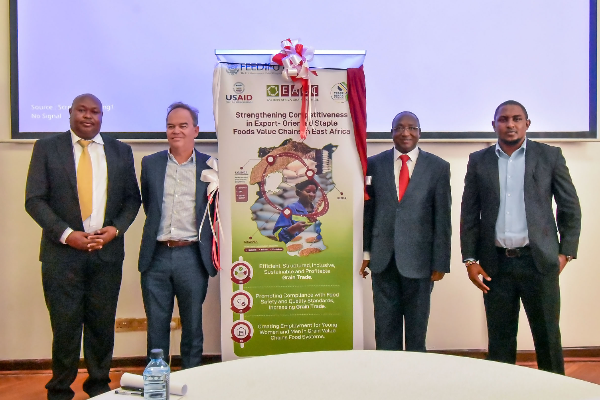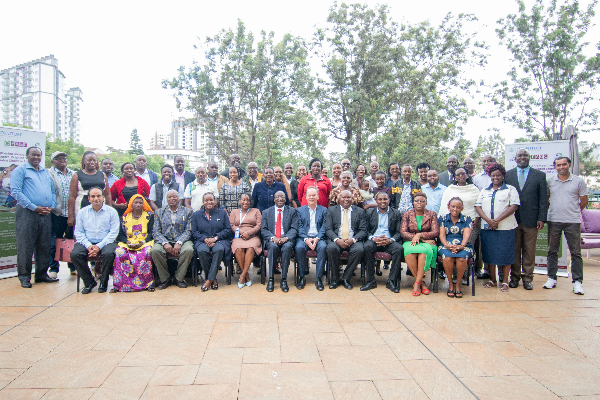The Eastern Africa Grain Council (EAGC) and Trademark Africa (TMA) have launched a three-year project to facilitate export-focused staple grains trade in East Africa.
The project- “Strengthening Competitiveness in Export-Oriented Staple Food Value Chains in East Africa” under the USAID funded “Economic Recovery and Resilience Activities (ERRA)” program will be implemented Kenya, Tanzania and Uganda- with Kenya being the destination market and Tanzania and Uganda as suppliers due to their surplus production.
The project comes at a time when the food commodities trade faces significant instability and
decline. Challenges such as low aggregation, informal trading, and limited farmer integration into
formal trade have resulted in high transactional costs. Inadequate storage and quality management
infrastructure, coupled with a lack of post-harvest handling skills and knowledge, further exacerbate the situation.
Additionally, there is limited information on export market opportunities, inadequate access to quality management services, and a scarcity of finance for trade and
infrastructure development. High logistical costs due to inefficiencies in road transport and delays
in cross-border processing, along with weak regulatory enforcement, further compound these challenges.
Inadequate storage and quality management infrastructure, coupled with a lack of post- harvest handling skills and knowledge, further exacerbate the situation. Additionally, there is limited information on export market opportunities, inadequate access to quality management services, and a scarcity of finance for trade and infrastructure development.
In this, the project aims to achieve several objectives. Firstly, it seeks to strengthen farmer-operated grain business hubs (G-Hubs), enabling them to utilize technology to enhance grain production, quality, and trade. Additionally, the project aims to develop enterprise-level capacities and institutional mechanisms to scale up Sanitary and Phytosanitary (SPS) standards and quality compliance, thereby increasing export-oriented grain trade. Furthermore, it aims to establish and enhance an information hub to inform regional food balance sheets and shape national and regional food security and trade policies, fostering an enabling regulatory environment for trade.

Giving his remarks Gerald Masila, Executive Director of EAGC, voiced his excitement with the launch of the project, emphasizing its alignment with EAGC’s mission to advocate for an enabling environment and promote structured grain trade for optimum benefits of its stakeholders.
Masila underscored the expected benefits of the project to the sector, such as improved production, access to agricultural financing, capacity enhancement, and mentorship in SPS and quality compliance, trade linkages and an enabling environment for trade.
Joseph Kimote, Vice Chairman and Kenya Country Director of EAGC, highlighted the project’s goal of fostering collaboration and innovation within the staple food value chains. “By empowering farmers and strengthening market linkages among SMEs, we aim to create a more resilient and inclusive grain sector in East Africa,” he remarked.
Key intervention areas of the project will focus on commercialization of small holder farmers’ activities, SME businesses, and improving the grain trade policy environment for staple foods export.
The project will enhance export-oriented market access for Tanzania and Uganda with the Kenyan market, promoting greater regional integration and trade through empowering smallholder farmers by improving their access to relevant Business Development Services (BDS), thereby enhancing production and trade efficiency.
Furthermore, it will strengthen the capacity of firms along the grains export value chain in Uganda and Tanzania, enabling them to capitalize on export opportunities and contribute to economic growth.
On his part, Mark Priestley, Chief of Party for the ERRA project at TradeMark Africa, stressed on
strategic collaboration with EAGC and USAID, highlighting its potential to enhance grain exports within the region through strategies such as Grain Business Hubs (G-Hubs) operated by farmers, who will utilise technology to enhance grain quality and stimulate trade.
Key intervention areas include commercialisation of smallholder farmers’ activities, SMEs and improving the grain trade policy environment for staple foods export.
The project will enhance export-oriented market access for Tanzania and Uganda with the Kenyan
market, promoting greater regional integration and trade. It will empower smallholder farmers by improving their access to relevant Business Development Services (BDS), thereby enhancing production and trade efficiency.
Also, it will strengthen the capacity of firms in the grains export value chain in the three countries.








